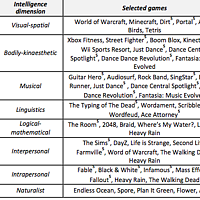Relation Between Multiple Intelligences and Game Preferences: an Evidence-Based Approach

There is a bulk of research demonstrating that individualized instruction yields much better results than the traditional uniform approach of one-size-fits-all. An interesting approach to understanding individual differences among learners is Gardner’s theory of Multiple Intelligences, stating that the intelligence of people is multi-dimensional and people have a unique blend of intelligences. According to Gardner the big challenge in education is how to best take advantage of this uniqueness. In the literature, it is suggested that people with different intellectual strengths often exhibit clear preferences toward specific modalities and types of interaction in relation to learning. This raises the question whether this knowledge could be transferred and employed in the design of (serious) games, i.e., do players with different intellectual strengths have preference for different games or game constructs and can these preferences be used to improve the game and/or learning experience?
Various theoretical claims regarding these issues have been made but have hardly been substantiated with empirical evidence. We take a step towards that end as we empirically investigate whether individual differences in terms of Gardner’s multiple intelligences correlate with differences in terms of game preferences. This is performed by means of an online survey study among 308 avid gamers. We found that individual differences in terms of intelligences do in fact correlate with preferences for specific games. The results of the study also show that the correlations between players’ intelligences and game preferences cannot be simply explained by considering the genre of the games. This indicates that it will be necessary to look into more detail to the components of the games to be able to explain the preferences and identify what game characteristics are preferred by players exhibiting certain intelligences. Moreover, our results indicate that the theoretical mappings suggested in the literature can be refined and completed further based on the evidences we provide.
Various theoretical claims regarding these issues have been made but have hardly been substantiated with empirical evidence. We take a step towards that end as we empirically investigate whether individual differences in terms of Gardner’s multiple intelligences correlate with differences in terms of game preferences. This is performed by means of an online survey study among 308 avid gamers. We found that individual differences in terms of intelligences do in fact correlate with preferences for specific games. The results of the study also show that the correlations between players’ intelligences and game preferences cannot be simply explained by considering the genre of the games. This indicates that it will be necessary to look into more detail to the components of the games to be able to explain the preferences and identify what game characteristics are preferred by players exhibiting certain intelligences. Moreover, our results indicate that the theoretical mappings suggested in the literature can be refined and completed further based on the evidences we provide.
Publication Reference
Sajjadi, S., Vlieghe, J., & De Troyer, O. (2016). Relation Between Multiple Intelligences and Game Preferences: an Evidence-Based Approach. In T. Connolly, & L. Boyle (Eds.), Proceedings of The 10th European Conference on Games Based Learning. (pp. 565-574). Academic Conferences and Publishing International Limited.

